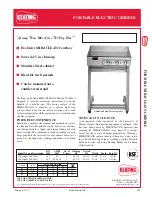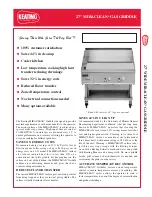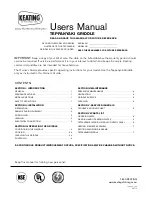
ENGLISH
11
CARE AND MAINTENANCE
CHECKING THE GAS LEVEL
To check the amount of fuel in the LP gas cylinder, the griddle must be in operation. Place your hand at the top of the tank and
slowly move down the side until the tank feels cool to the touch. This will indicate the approximate amount of gas in your tank;
if ¾ empty, replace with full tank.
IMPORTANT: Do not use charcoal briquettes or any flammable material with your griddle. Use of such
material will void your warranty and may lead to a fire, explosion and bodily harm.
CLEANING FREQUENCY
Any Pit Boss® unit will give you many years of flavorful service with minimum cleaning. Follow these cleaning and maintenance
tips to service your griddle:
1.
BURNER COMPONENTS
• Clean the burner whenever heavy build-up is found, to ensure that there are no signs of blockage (debris, insects)
on the burner tube or in the burner portholes. After periods of storage, spiders or small insects can build nests,
webs, and lay eggs in the burner tube, obstructing the flow of gas to the burner. If storing the griddle or before an
extended period of non-use, remove the burner and wrap with aluminum foil to reduce the risk of insects entering
the burner holes.
• The burner has been preset for optimal flame performance. A blue flame, possibly with a small yellow tip, is the
result of the optimal air and gas mixture. If flames are excessively yellow, orange or irregular, clean the oil and food
deposits on the burner surface and the burner portholes to increase airflow.
2.
GRIDDLE SURFACE
• Your griddle comes preseasoned from the factory, but it is important to clean and season your griddle after
each use to prevent rust, extend the life of your griddle, and create a non-stick cooking surface. The seasoning
of your griddle is a continuous process that must be repeated over the life of your griddle to ensure the best
cooking experience and longest life for your griddle.
1. Clean the griddle after each use, using a spatula or scraper to remove all food and debris from cooking surface.
2. Liberally apply an even coat of cooking oil to the cooking surface. Vegetable, olive, peanut, coconut, and
sesame oils are all suitable for seasoning your griddle.
3. Turn the griddle off, and allow to cool in a cool, dry location.
• Remove any food or build-up from the cooking surface. Best practice is to do this while it is still warm from a
previous cook. Grease fires are caused by too much fallen debris on the cooking components of the griddle. Clean
the inside of your griddle on a consistent basis. In the event you experience a grease fire, carefully remove the food,
turn the griddle off. Lightly sprinkle baking soda, if available.
• Check your grease cup often, and clean out as necessary. Keep in mind the type of foods that are cooked.
• Use a grill cover to protect your griddle for complete protection! A cover is your best protection against weather and
outside pollutants. When not in use or for long-term storage, keep the unit under a cover in a garage or shed, with
the gas cylinder removed (must be stored outdoors).
CLEANING TIME TABLE (NORMAL USE)
ITEM
CLEANING FREQUENCY
CLEANING METHOD
Cooking surface
After each use
Burn off excess, scrub pad & soapy water, season with cooking oil
Grease cup
After each use
Empty, scrub pad & soapy water
Burner tube, portholes
Every 5-6 uses
Dust, scrub pad & soapy water
Flame tamers
Every 5-6 uses
Scrub pad & soapy water
Burners
Every 5-6 uses
Scrub pad & soapy water





































